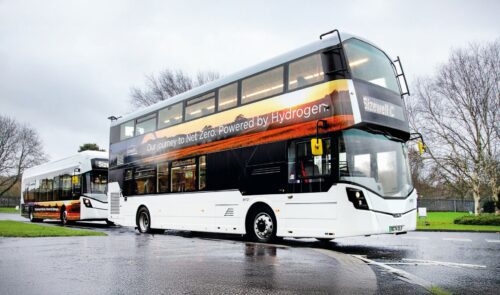
Four hydrogen buses are being tested as part of a plan to decarbonise site transport at the power station construction site
Wrightbus Hydroliner double-deckers are being used as part of a trial at the Sizewell C nuclear power station construction site. Construction workers could be taken to work by hydrogen buses for the entirety of the nuclear power station’s construction, if the trial is successful, says Wrightbus.
Three double-deck buses and one single-deck bus are being used to carry Sizewell C workers as part of a pilot scheme to test operational performance of the clean technology, which could help to play a part in decarbonising the construction phase of the power station and the impact of workforce transport on the local area.
The project has previously pledged to deliver 60% of its construction materials by rail and sea to limit construction emissions and reduce the amount of construction traffic on local roads. The partners say the move could help kickstart the hydrogen economy in the region, provide opportunities for further hydrogen uptake, and accelerate transport decarbonisation in Suffolk. If the pilot is successful, Wrightbus says Sizewell C could order up to 150 hydrogen buses, creating the UK’s largest hydrogen bus fleet.
Julia Pyke and Nigel Cann, Joint Managing Directors of Sizewell C, said: “Sizewell C is going to power six million homes and play an important part in the UK’s energy security. We have an ambition to build in a way which is sustainable and reduces carbon emissions. It’s also a great opportunity to work with another UK business which is training young people for the jobs of the future.
“Nuclear has lots of benefits for hydrogen production, and as a fuel source hydrogen has the potential to make a significant difference
to our project – reducing carbon emissions, improving air quality and limiting the impact of our workforce transport on the local area. If the trial goes as we hope, it could lead to a significant order of UK hydrogen buses, supporting homegrown UK business, and helping to kickstart the hydrogen economy in the East of England.”
The project is also looking at using electric buses as part of a mixed zero-emissions fleet, and expects to make an order for electric buses shortly too. Julia and Nigel added: “We’ve had some independent analysis that looks at what kind of technology we need for each transport route, and so it could we be that we have a mixed fleet, with hydrogen and electric buses working together. Our ultimate ambition is that all our buses are eventually zero emissions.”
Wrightbus CEO Jean-Marc Gales commented: “We’re delighted to see this trial underway. Like Sizewell C, at Wrightbus we’re striving a zero-emission future. We are unwavering in our commitment to hydrogen being part of the energy transition. We have an army of operators across the UK and Europe which realise that hydrogen meets their demands better than electricity. Indeed, for some rural routes electric buses are simply unable to cope. We always said hydrogen was for big and heavy machines and these buses are a perfect example of this in practice.”
The hydrogen refuelling station used for the trial will be the first of its kind in Suffolk and Wrightbus believes that the infrastructure could encourage further development of hydrogen transport across the region. The project is part of a consortium led by clean energy company Ryze Power, which is providing green hydrogen for the bus trial and which was awarded more than £3m of government funding to test a mobile hydrogen refuelling system. If successful, the technology could eventually reduce the need to use fossil fuels in machinery and equipment.
Sales Director at Ryze Alex Webster said: “At Ryze Power, we’re already involved in a number of successful hydrogen trials across transport, construction and aviation. Hydrogen is a safe, zero-emission fuel that has a huge part to play
in the decarbonisation of hard-to-abate sectors. Refuelling a hydrogen bus takes just eight minutes – the same time as it takes to fill up with diesel, but without the resulting emissions.
“Our mobile hydrogen refuelling systems are the perfect way to introduce a reliable supply of hydrogen that, once up and running at scale, could benefit the wider regional hydrogen ecosystem across the East of England. We’re very much looking forward to seeing how the Sizewell C trial evolves.”

